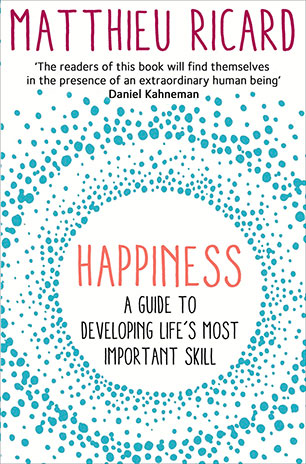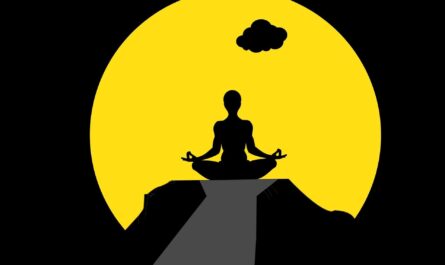I never considered myself a happy person because I always thought I was incomplete. I believed I would find happiness when certain stars aligned and my life looked the way I wanted it to. When those stars finally aligned, I still did not feel happy. So, I started delving into the question of how to be happy, which is how I found Matthieu Ricard’s book “Happiness: A Guide to Developing Life’s Most Important Skill.“

Ricard is a molecular biologist turned Buddhist monk. He was among the first monks to invite scientists to study Buddhism and test its practices under the scientific microscope. A 12-year study by the University of Wisconsin found that Ricard’s own brain exhibited exceptional activity in the areas associated with positive emotion, especially when meditating on compassion. As the media reported the news, he was dubbed the “happiest person on Earth.”
Redefining happiness
Most of us equate happiness with temporary pleasures, achievements, and material possessions. Ricard proposes a different view. He defines happiness not as a mere emotion or momentary joy, but as a deep sense of serenity and fulfillment that persists regardless of life’s ups and downs. In essence, it is about finding enduring peace, inner harmony, and a profound sense of purpose.
Ricard writes that our common roadblocks to happiness are habitual negative mental patterns, such as anger, jealousy, and hatred. These are emotions that bubble up when something threatens our “ego”. It could be a nasty comment, our partner not responding to our texts, or manipulative behavior. Since we perceive these as threats, we enter a defense mode to protect our self, our “ego”. The more threats we perceive, the more time we spend in that defensive state, until it eventually becomes our default state.
“[Happiness] is the purging of mental toxins, such as hatred and obsession, that literally poison the mind. It is also about learning how to put things in perspective and reduce the gap between appearances and reality.”
The problem is that we cannot control the world and others. Unpleasant things will always happen to us. Although we cannot prevent them, we can control how we react to them.
The solution lies in nurturing a positive state of mind through compassion, mindfulness, and altruism. This allows us to learn when to pause and assess before we react, and then react in a way that benefits ourselves and others.
Happiness as a skill
Ricard emphasizes that happiness is not an inherent trait, but a skill we can develop. While genetics play a role in predisposing some people to happiness, it’s not definitive. We can learn how to be happy just as we learn to play an instrument or speak a foreign language. Some people may be more talented and require less practice, but we all have the capability to be good at it.
Meditation or mind training is key for achieving this. By dedicating time to quieting the mind and fostering awareness, we can gradually tame the mind’s chaos, cultivate inner peace, and learn to remain content irrespective of life’s trials and tribulations.
In support of this, Ricard cites a lot of research done by leading Western scientists in the brain field, such as Francisco Varela, Richard Davidson, Paul Ekman, and Daniel Goleman. Their and others’ research shows how regular meditation physically alters the brain, leading to improved emotional health and wellbeing.
The role of altruism in cultivating happiness
Another distinctive aspect of Ricard’s philosophy is his emphasis on altruism. He passionately argues that genuine happiness is intimately tied to the act of giving and caring for others. It is through embracing altruism that we can experience a profound sense of interconnectedness and move beyond our self-centeredness to find enduring contentment.
I will insert a personal comment here: Interestingly, these effects are similar to those reported by research participants using psilocybin (“magic mushrooms”). They often experience an increased sense of life satisfaction, interconnectedness, empathy, and altruism. This has sparked a growing interest in the therapeutic potential of psilocybin and other psychedelics in mental health. The way I understand this is that psilocybin could potentially provide a quicker route to achieving the states of positive consciousness typically experienced by seasoned meditators.
Back to the book, Ricard suggests that cultivating altruism has a dual effect: it not only enhances our personal happiness but also contributes to a more compassionate and harmonious society. This is how kindness and altruism can truly revolutionize the world.
The power of happiness in leadership
Although Ricard does not touch on this topic in his book, applying his insights in a leadership context can be transformative. Leaders who prioritize happiness can create a positive and productive work environment. Happy leaders are also more successful (“the happiness advantage”), because they are better equipped to handle stress, make balanced decisions, and maintain positivity. This transformation can inspire team members, leading to a more engaged and motivated team.
Moreover, Ricard’s emphasis on altruism provides a valuable lesson for leaders. By nurturing a culture of empathy, cooperation, and mutual respect, leaders can foster a sense of community and interconnectedness within their teams. Such an environment not only improves job satisfaction, but also boosts creativity and productivity.
Integrating mindfulness and meditation practices into the workplace is the first step to teaching employees how to be happy. Such practices can help team members manage stress, increase focus, and improve emotional well-being. By promoting a happier and healthier work environment, leaders can contribute to both the personal growth of their team members and the overall success of their organization.
Summary
- The key to lasting happiness is not hidden in the external world but lies within us; it is a skill to be nurtured.
- Cultivating happiness involves mind training, promoting positive thinking, and being altruistic.
- Implementing these lessons can improve not only our happiness but also the happiness of those around us.





